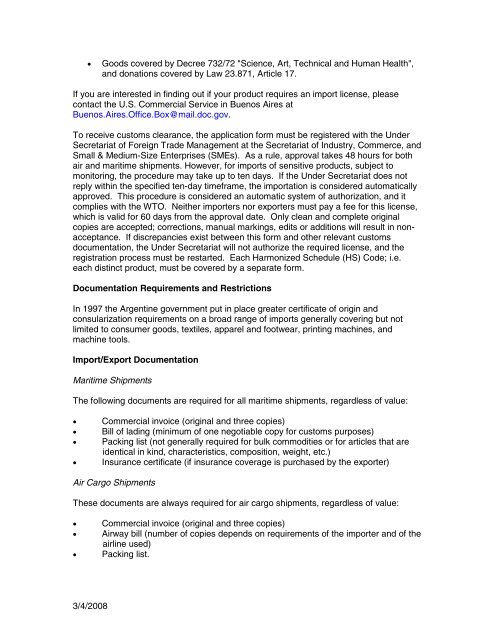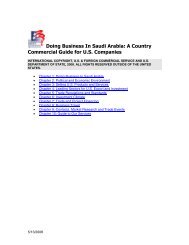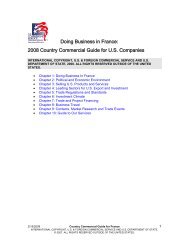You also want an ePaper? Increase the reach of your titles
YUMPU automatically turns print PDFs into web optimized ePapers that Google loves.
3/4/2008<br />
Goods covered by Decree 732/72 "Science, Art, Technical and Human Health",<br />
and donations covered by Law 23.871, Article 17.<br />
If you are interested in finding out if your product requires an import license, please<br />
contact the U.S. Commercial Service in Buenos Aires at<br />
Buenos.Aires.Office.Box@mail.doc.gov.<br />
To receive customs clearance, the application form must be registered with the Under<br />
Secretariat of Foreign Trade Management at the Secretariat of <strong>In</strong>dustry, Commerce, and<br />
Small & Medium-Size Enterprises (SMEs). As a rule, approval takes 48 hours for both<br />
air and maritime shipments. However, for imports of sensitive products, subject to<br />
monitoring, the procedure may take up to ten days. If the Under Secretariat does not<br />
reply within the specified ten-day timeframe, the importation is considered automatically<br />
approved. This procedure is considered an automatic system of authorization, and it<br />
complies with the WTO. Neither importers nor exporters must pay a fee for this license,<br />
which is valid for 60 days from the approval date. Only clean and complete original<br />
copies are accepted; corrections, manual markings, edits or additions will result in nonacceptance.<br />
If discrepancies exist between this form and other relevant customs<br />
documentation, the Under Secretariat will not authorize the required license, and the<br />
registration process must be restarted. Each Harmonized Schedule (HS) Code; i.e.<br />
each distinct product, must be covered by a separate form.<br />
Documentation Requirements and Restrictions<br />
<strong>In</strong> 1997 the Argentine government put in place greater certificate of origin and<br />
consularization requirements on a broad range of imports generally covering but not<br />
limited to consumer goods, textiles, apparel and footwear, printing machines, and<br />
machine tools.<br />
Import/Export Documentation<br />
Maritime Shipments<br />
The following documents are required for all maritime shipments, regardless of value:<br />
Commercial invoice (original and three copies)<br />
Bill of lading (minimum of one negotiable copy for customs purposes)<br />
Packing list (not generally required for bulk commodities or for articles that are<br />
identical in kind, characteristics, composition, weight, etc.)<br />
<strong>In</strong>surance certificate (if insurance coverage is purchased by the exporter)<br />
Air Cargo Shipments<br />
These documents are always required for air cargo shipments, regardless of value:<br />
Commercial invoice (original and three copies)<br />
Airway bill (number of copies depends on requirements of the importer and of the<br />
airline used)<br />
Packing list.












